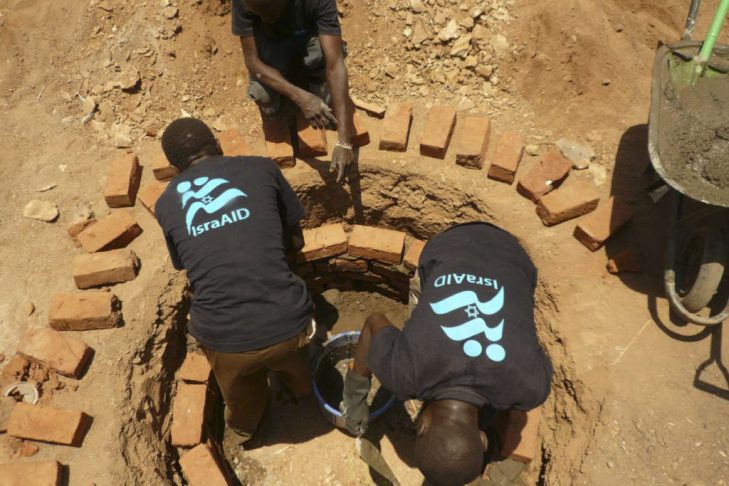Yotam Polizer is co-CEO of IsraAID, a nonprofit NGO which has brought disaster relief and humanitarian aid to 39 countries. Polizer spoke recently at Temple Israel of Natick on “How Israel Became a World Leader in Disaster Relief and Humanitarian Aid.”
Growing up in Israel Polizer remembers how deeply affected he was when he heard of the suffering of millions from natural disasters and armed conflicts throughout the world. When his service in the Israel Defense Forces ended in 2006, like many of his fellow soldiers he traveled to India. He also visited Nepal. “I fell in love,” he recalled. He stayed in Nepal, volunteering with street children, working with the Israeli embassy and learning Nepalese. In 2015, less than 24 hours after the Nepal earthquake, Polizer was in back in Katmandu, as part of IsraAID’s relief efforts. He stayed for six months.
Founded in 2001, IsraAID has brought aid and comfort to over a million people, distributed thousands of tons of relief and medical supplies and mobilized over 850 staff, professionals and volunteers. IsraAID teams were at the forefront in disaster relief after the 2011 tsunami in Japan, during floods in Peru and Colombia, in the Philippines after the 2013 typhoon, in Sierra Leone during the Ebola outbreak and in New Orleans after Hurricane Katrina. Polizer was on the ground with his colleagues at many of the major disasters in recent years. He stayed in Japan for five years, where he also learned to speak Japanese. Polizer showed a picture from four days after the earthquake of a boat resting on top of a destroyed home. “The Japanese are reluctant to have outsider help,” he said, “but we bring Israeli chutzpah. Unfortunately Israel is too good at handling trauma. We were able to offer emotional support to many people there.”
IsraAID, he noted, was in Haiti after the 2010 earthquake, before U.S. teams arrived. “We’re still there seven years later, building their own capacity to respond to crises.” When another hurricane hit Haiti in 2016 Haitians had a team of their own who were available to help. “I go to places people are running away from,” Polizer mused. Passengers on his plane to Sierra Leone consisted of himself and his colleague and no one else except the flight crew. He noted that the hardest and most dangerous work IsraAID has engaged in is in war-torn South Sudan. “It’s the worst place in the world right now,” he said. His teams have been evacuated on several occasions.
IsraAID has also brought its skills and compassion to a camp for Yazidis, a religious minority from North Syria. In 2013 ISIS killed 6,000 Yazidi men and turned thousands of women and girls into sex slaves. One Yazidi specifically told Polizer that his people need help from Jews, because Jews were successful in building their own state.
In his talk in Natick, Polizer focused on IsraAID’s work with Syrian refugees. While acknowledging that teaching hatred of Jews is endemic to the Syrian school system and in other Arab societies, Polizer said, “It is our duty to help these people. The Syrian tragedy is an opportunity. We help people from Syria as well as Iraq and Iran, countries with whom we have no diplomatic relations. This is an opportunity to build bridges and change perspectives.”
Thousands of Syrians have traveled through Turkey, where they board rafts and sail to the Greek Island of Lesvos. “We treat them right on the beach,” said Polizer. Refugees arrive cold, hungry, sometimes sick or injured. They are greeted by the team from IsraAID, clad in T-shirts featuring the organization’s name and a big Jewish star. Said Polizer, “They probably think they took the wrong boat. Often they don’t know where they are or who we are.”
IsraAID provides immediate medical care, food and clothing. Israeli Jews, Muslims, Christians and Bedouins work side by side. Many speak the language of the refugees, which helps in offering comfort. Polizer remembers helping a shivering 2-year-old while his father watched in shock. “My worst enemy became my biggest supporter,” said the father. “Those at home who were supposed to help me drove me away.” “Now,” said Polizer, “we’re Facebook friends.”
“We can’t change everyone, but we do meet thousands of Syrians in our work. What keeps me going are the real life miracles,” he said, coming full circle back to his beloved Nepal. After the earthquake there workers were pulling bodies from a collapsed building, unable to account for one of the 22 who were thought to have been in the building. IsraAID workers used a life detector, a device which can detect motion as subtle as human breathing under rubble. Polizer was asked to crawl into the rubble and scream something in Nepalese. As he did so he was answered by a faint cry, “It hurts.” A woman had survived 130 hours in an air pocket with no food or water. She is now in good health. Polizer also recalled a pregnant Syrian refugee who landed on the beach in Greece. “How far along is she?” an IsraAID worker asked the on-site workers over his phone. The response: “I can see the head.” The baby was delivered on the shore. The mother now refers to the IsraAID physician who delivered her son as his “second mother.”
IsraAID continues its work in ravaged disaster areas and in developing countries, bringing Israeli water technology to 16 countries, including refugee camps and disaster areas. In Germany they work with the Jewish community to help resettle refugees. Volunteers include a Holocaust survivor in his 80s who teaches those he helps about his experiences.
Polizer was asked if he brings his presentations to college campuses. He responded that he had visited 60 campuses in one year, spreading the word about the good work of IsraAID, with the goal of countering anti-Israel propaganda. IsraAID has created internships for students to serve as ambassadors for Israel to engage with Muslims and Christian students.
IsraAID does not receive funding from the Israeli government but works with the government and the IDF in providing services. “We are the biggest humanitarian NGO in Israel,” said Polizer. There are 274 paid staff currently working in 18 countries along with volunteers including doctors, nurses and psychologists. They are supported financially by private donors and receive funding from the U.N., especially for their work in Africa.
View a moving video on IsraAID’s work with Syrian refugees here. For more information, go to israaid.co.il.
This post has been contributed by a third party. The opinions, facts and any media content are presented solely by the author, and JewishBoston assumes no responsibility for them. Want to add your voice to the conversation? Publish your own post here. MORE



